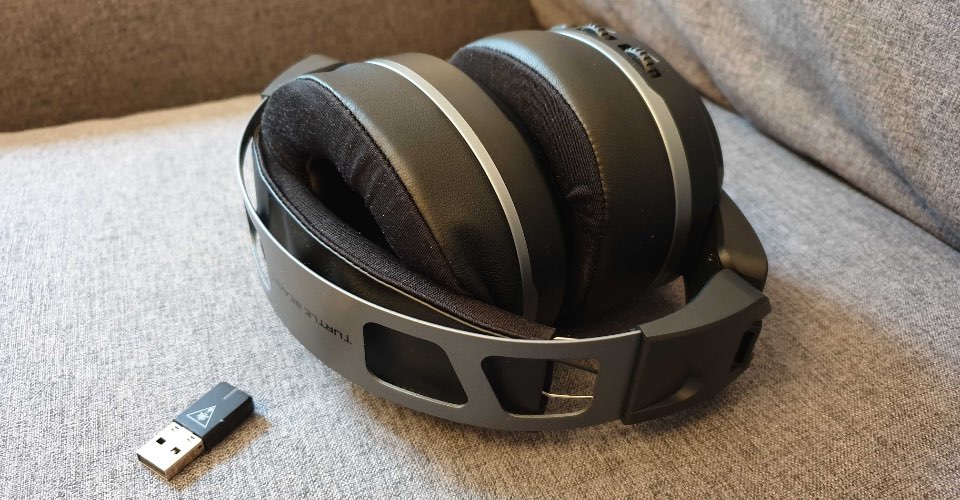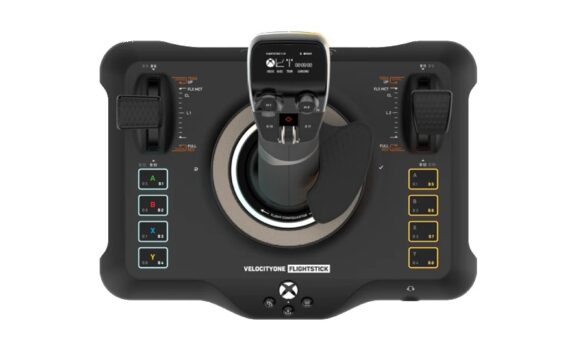If there’s ever a company whose name will eternally be linked with gaming headsets, it’s Turtle Beach. While the company formed in 1975, it didn’t jump into gaming headsets until thirty years later, doing so at just the right time to take advantage of the boom of online gaming through the 360/PS3 generation. If you had a headset on while playing Halo 3, Gears of War or Call of Duty, there was a pretty good chance it was from Turtle Beach.
There’s a pervading perception that Turtle Beach headsets aren’t particularly good, though. Part of that comes down to the cheap build quality of headsets from those early days, while the fact that they’ve continued to offer cheaper, entry level offerings, when other companies have pushed ever closer to the premium bracket, hasn’t helped. It couldn’t be further from the truth.
The Elite Atlas Aero, with a RRP of £129.99, is admittedly priced towards the top end of Turtle Beach’s range. Building on a near-identical frame to the Elite Pro and Elite Pro 2, which both stand amongst my favourite gaming headsets of all time, the Atlas Aero adds wireless to the mix, while retaining a wired 3.5mm as a fallback. It’s the kind of headset that is capable of being all things to all people, and it’s good enough that you’ll want it to be.
The Atlas Aero is a serious looking piece of kit. Fashioned from solid black plastics, with silver highlights and an industrial metal headband, they avoid many of the gaming headset faux pas, and come away feeling adult and restrained. They’re still pretty damn chunky, but no more than many other over ear headphones you’ll see out and about.
If you’ve got a sensible phone with a sensible 3.5mm headphone socket, you can absolutely take these out in the sunlight with you, and no one will realise that you’re – whisper it – a gamer. They fold up pretty well too, with folding joints on each arm so they’re compact enough to bunge them in a bag, and the earcups can rotate to sit on your shoulders without making you feel like a well-meaning aunt is squeezing your cheeks together. They genuinely do everything you could hope they would.

The included 3.5mm cable has an inline volume control with an in-built microphone, making it perfect for mobile phone use, or casual gaming sessions. If you’re planning to go pro though, you’ll need to install the removable mic arm. It slots straight into the left earpiece, and features a noise-cancelling unidirectional microphone. Just like the Elite Pro 2, it features Truspeak tech that aims to keep everything crisp and clear. Other players reported that it certainly managed to do that, and they could hear my every word. While that might be a shame for them during yet another Warzone team loss, it’s certainly a win for the Atlas Aero.
Despite its wired universality, and the fact it’ll work fully wirelessly with the Nintendo Switch and in a limited capacity on PS4 – you have to manage volume and audio mix via the PS4 system – the Atlas Aero is primarily aimed at the PC market. It utilises the Turtle Beach Control Studio to give you access to a huge variety of features, from different EQ presets and noise gating through to 3D surround sound. You can even remap two of the controls to tackle whichever function you want them to.
The PC software also gives access to one of my favourite features; variable mic monitoring. This allows you to hear your own voice, and is great for stopping you from unintentionally shouting at the top of your lungs every time someone gets the drop on you in whichever flavour of battle royale you favour.
The Atlas Aero holds onto whatever settings you plug into it as well, so if you do want to use it with another format you can still customise its output to your liking, albeit without the immediacy that making real time changes on PC will give you. I’m often disappointed by the software functionality for peripherals, but Turtle Beach’s goes above and beyond what you see from most manufacturers, and best of all, it works.

Thanks to the addition of all that fancy wireless technology, controls for volume, power, two customisable controls, and its incredibly healthy thirty-hour plus battery life, you’d expect the Elite Atlas Aero to have put on a few pounds, but somehow it sits at 400g, more or less the same as the Elite Pro 2. It’s still not the lightest of headsets out there, but Turtle Beach have turned all of their current comfort know-how to bear on them, and somehow made any weight it does have virtually meaningless.
Just as with the Elite Pro series, the Atlas Aero features a suspended headband, which everyone from Sades through to Steelseries seem to have hit upon as being the ultimate answer to extended wear time. A sprung piece of memory foam and leather, it helps to spread the weight of the headset across your head, and it is impressively effective.
Alongside that the Atlas Aero boasts Turtle Beach’s top-end ear cushions, filled with their eternally odd cooling gel – these things are weirdly and refreshingly cold every time you put them on – and memory foam, which form an excellent acoustic seal around your ears
There’s the return of Turtle Beach’s Pro-specs technology as well, which essentially amounts to a hidden notch that stops glasses from painfully pressing into your head. They are indispensable; if you wear glasses you should be scoping out a pair of Turtle Beach headphones, it’s as simple as that.

There only remains one real question: do they sound any good? Resoundingly, yes. The Elite Atlas Aero are, alongside the Elite Pro and Pro 2, the best-sounding Turtle Beach headsets out there. In stereo mode they have a pleasingly wide soundstage, and the 50mm drivers are capable of both absorbing bass and distinct tops. No matter what I put through them, whether games, movies, or music, I never failed to be bowled over by the listening experience. Wirelessly it’s the same story – there’s a barely distinguishable hiss that you can just about hear with no audio input running through them, but the audio retains every nuance you can hear when you’re wired up. The fact that they’ve been able to add wireless functionality, and keep the weight more or less the same as the Elite Pro 2, is astounding.
If we’re looking for faults they’re exceedingly few and far between. There’s a very cool cubby hole for the USB transmitter behind the right ear pad, but it’s so secret you might not find it. In terms of the competition I’d willingly put them up against anything else out there in the £130 price range – the Razer Nari probably comes closest on comfort, but its looser fit won’t be for everyone – but considering you can find the Elite Atlas Aero for as low as £100, there’s little that will beat them.





